(Passing pencils: Working with people in other languages)
There were six of us sat in the tailors on Bochumer Straße in Recklinghausen, Germany. Myself and Sarah, Julian, Zoë, Gülten and the tailor himself – Halil. We were interviewing local people for our project – The people of. I led the interview, asking a question to Zoë (who speaks English and German), Zoë then asking the question in German to Gülten (who speaks German and Turkish), and then Gülten asking the question in Turkish to Halil who spoke Turkish and a very little German – enough for him to get by when customers described how they wanted their clothes fixing. Then the tailor would answer the question, and the chain would start again. Gülten back to Zoë, Zoë back to us. Julian, who speaks English and German was recording the whole thing. I sat there thinking about all the sounds a human mouth could make, how they make up words, that make up sentences that mean we can communicate with each other.
Growing up I used to speak ‘gobbledygook’ to myself and wonder if any of what I had said was a word in a different language – what it would mean, what people who spoke it looked like, if it was a swear word, or somebody’s name. Maybe I said something in Turkish?
I have no idea what the tailor was actually asked. I know the original question of course, but not the nuance of what he was actually asked. If it was open or ruthlessly direct. The loss in translation, at times felt frustrating…
Maybe it’s useful though? Maybe being a tourist permits me to ask slightly tougher questions because I am unfamiliar. However, when someone is translating for you, the language is quite literally filtered through them. No matter how skilled the interpreter/translator. Sounds are sifted, altered, meanings tweaked, made sense of in another language. The question can and will change, it must, to make it work. The toughness could be filtered down into something more palatable. I’m not saying this is a deliberate change but a possible one. It’s impossible for the English question to hold the same references, intent, resonances as the German and the Turkish version. This means that the interview of the tailor does not just tell us something about Halil but will inevitably tell us something of Gülten and Zoë too, hidden in the choice of words.
Specifics of language are important to the work we make as Quarantine. We ask a lot of questions and carefully consider the phrasing of them. But as foreigner without any German, or any of the languages spoken in that area, what can you do? You must trust and accept the second-hand information, always feeling like you are missing out on the full story – because the reality is, you are.
At least in the interview with the tailor, I didn’t feel alone in my FOMO (fear of missing out). There was at least one language being spoken, that at least one person didn’t understand. We were in it together and we ploughed though. Hand gestures, nodding, pointing, laughing, misunderstanding, and jumping on anything that felt universally understood. I felt like I got to know the tailor a bit that afternoon, two languages removed.
I’ve worked with people in different languages before. I’ve learnt that my face is very animated and generally well received. I ‘get away with it’ but can’t quite shake the feeling as a white British 30 something female me ‘getting away with it’ is potentially problematic, and does me, and other people like me, no favours.
Working in Sâo Paulo, Brazil, I was involved in a heated exchange at a birthday party. A Brazilian man was unhappy that we, and the people we were chatting to, were speaking English. He said that we should be speaking Portuguese. He was probably right. I apologised and tried to explain that we had only been in the country for 2 weeks, recognising that we were in the minority – everyone else at the party was Brazilian. He responded in a mixture of Portuguese and English explaining that when he was in London he was constantly humiliated by people because he didn’t speak English. He repeatedly demanded that I speak Portuguese. The exchange ended with me feeling humiliated too, which seemed to be his aim.
Before this, I would have said I never assume when I meet new people that they (should) speak English, but how I exist in the world is at odds with this claim.
English is my only language. I understand a little French, German, Spanish and Portuguese (thank you Duolingo) enough to order a drink, say hello or ask where the toilets are but not enough to have a conversation. I have not invested proper time, money, or effort into learning another language. My limited language abilities (and thick Yorkshire accent) don’t leave much room to meet in the middle in a non-English conversation. I am assuming, hoping really, that someone else will do the heavy lifting.
We made Summer. in Bethune; France. The whole thing was in French. In the final rehearsal week I found myself colouring in with a 4 year old (she was in the show). She started teaching me the names of the colours in French, but mostly we drew. Next to us people were sitting round a huge table eating and answering questions like ‘Describe the view from your bedroom window,’ or ‘When was the last time you danced?’. I don’t know what was said, me and Amelie were having our own conversation, silently making colour choices, passing pencils between us.
Kate Daley
Artist & Producer for Quarantine
